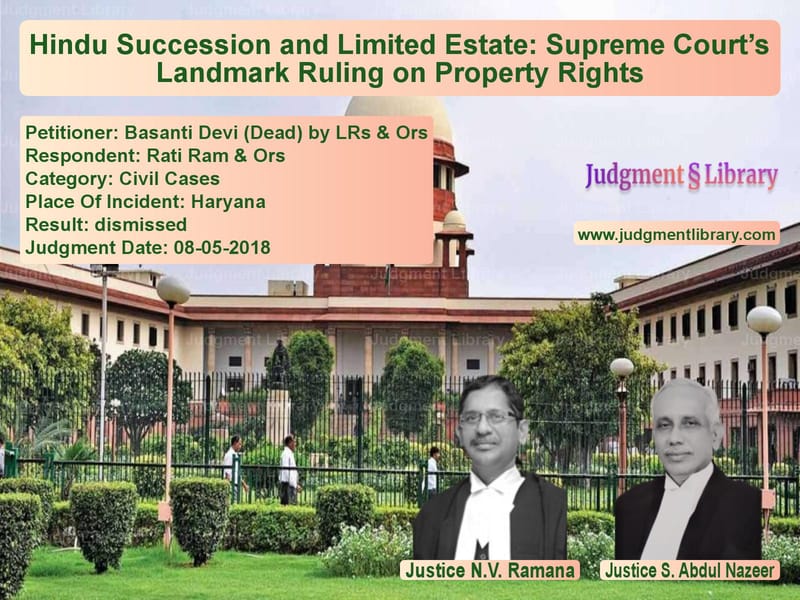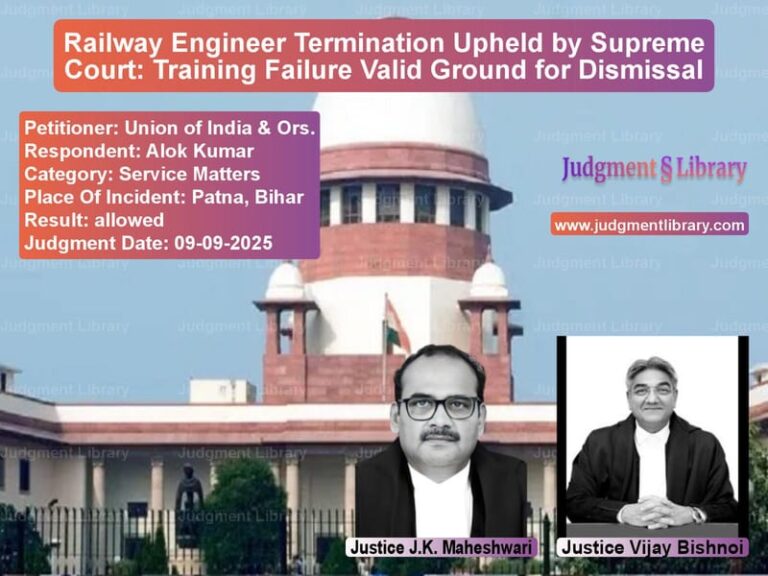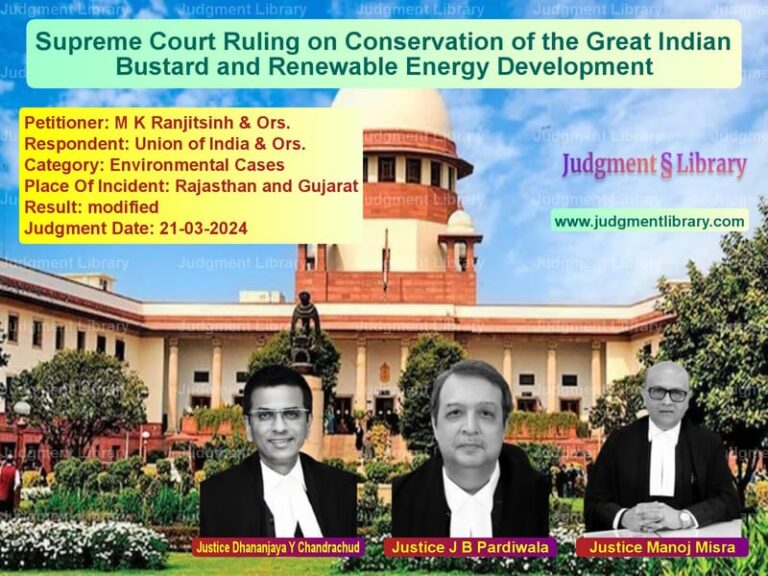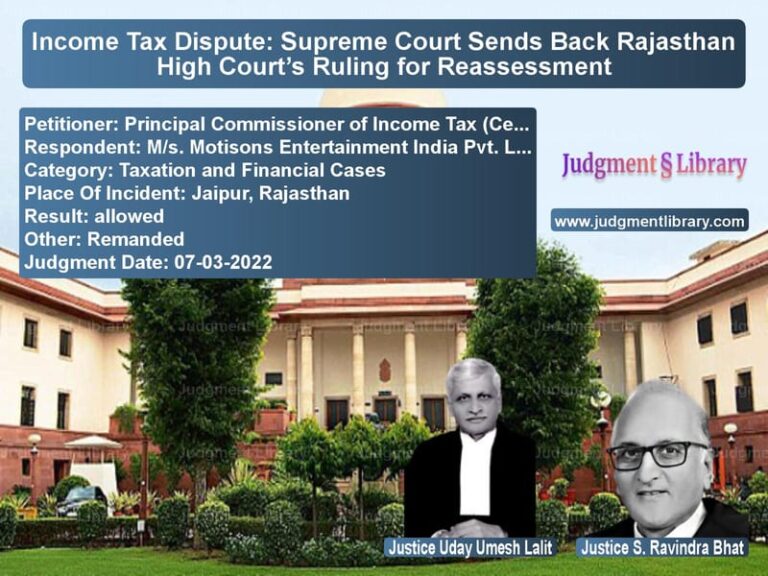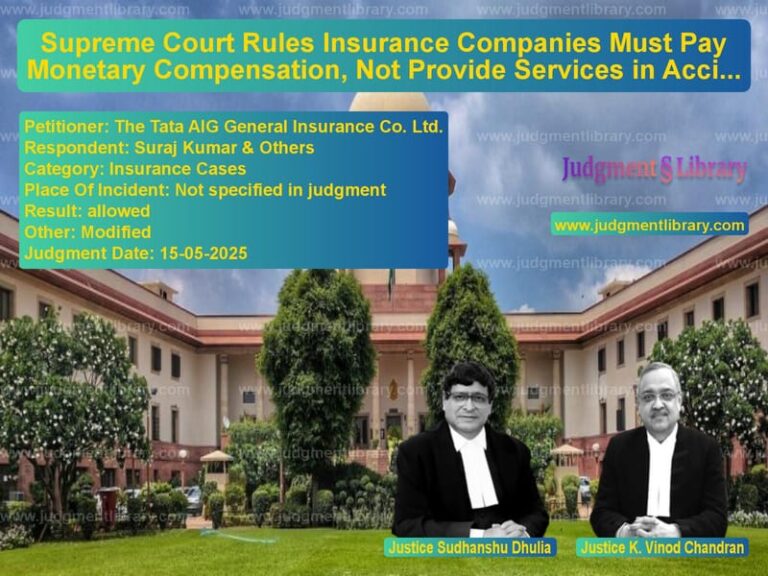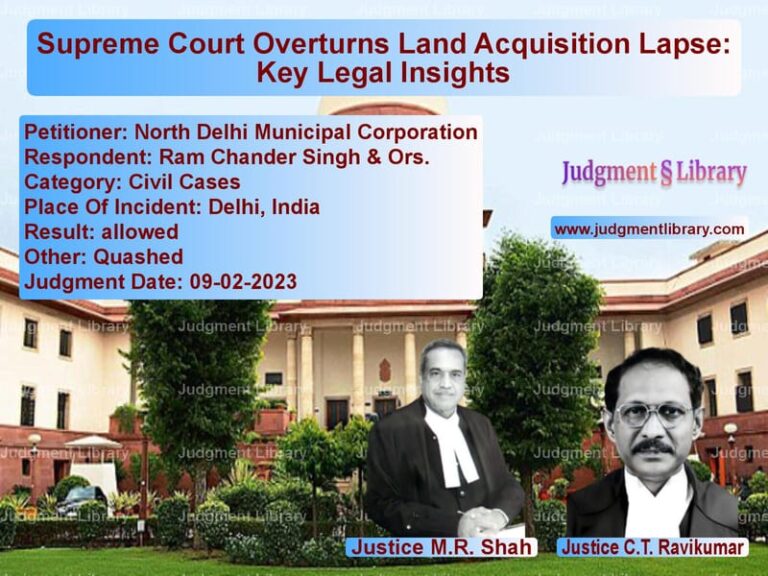Hindu Succession and Limited Estate: Supreme Court’s Landmark Ruling on Property Rights
The case of Basanti Devi (Dead) by LRs & Ors v. Rati Ram & Ors. dealt with the interpretation of property rights under the Hindu Succession Act, 1956. The Supreme Court had to determine whether a widow’s limited estate could be converted into an absolute estate under Section 14(1) or whether it remained restricted under Section 14(2). The ruling reaffirmed the principle that only pre-existing rights could be enlarged into full ownership and that a new right granted under a compromise decree did not entitle the widow to claim absolute ownership.
Background of the Case
The dispute originated from a claim over a 1/6th share of agricultural land measuring 348 kanals and 14 marlas in Berli Khurd, Tehsil Rewari. The plaintiffs argued that the land originally belonged to Har Narain, whose four sons inherited it. However, a dispute arose when two individuals, Sheo Lal and Makhan, claimed to be sons and heirs of Har Narain and had their names recorded in revenue documents.
A civil suit was filed challenging their title, which led to a compromise decree in 1932. The compromise granted Sheo Lal limited possessory rights to the land, specifying that he could not sell or mortgage the property. The decree also stated that after Sheo Lal’s death, his widow, Smt. Chhimli, would have a limited right to use the land but could not transfer it, and upon her demise, the property would revert to the plaintiffs.
Key Legal Issues
The Supreme Court had to resolve the following legal questions:
- Whether the limited estate granted to a widow under a compromise decree could be converted into an absolute estate under Section 14(1) of the Hindu Succession Act.
- Whether the widow, Smt. Chhimli, had a pre-existing right in the property that could be enlarged into full ownership.
- Whether Section 14(2) applied to the case, restricting her rights to those explicitly mentioned in the compromise decree.
Arguments by the Petitioner
The appellants, who were the legal heirs of Basanti Devi, argued that:
- Section 14(1) of the Hindu Succession Act applies to widows who possess a property, enlarging their limited rights into absolute ownership.
- Chhimli had lived on the land for several years, and as the widow of Sheo Lal, she had a pre-existing right to maintenance, which should be recognized as an ownership right.
- Since she was allowed to use the land under the compromise decree, her right to property should not be restricted under Section 14(2).
Arguments by the Respondent
The respondents argued that:
- The rights of Sheo Lal and his widow arose from the compromise decree, and they had no pre-existing right in the property.
- Under the decree, Sheo Lal had only limited possessory rights and could not transfer the land.
- The decree explicitly stated that upon the widow’s death, the land would revert to the plaintiffs, meaning that Section 14(2) of the Hindu Succession Act applied.
- The case did not involve a widow inheriting property in lieu of maintenance but rather a grant made under a compromise decree, which does not get converted into absolute ownership.
Supreme Court’s Observations
The Supreme Court examined the nature of the compromise decree and its impact on property rights. The Court stated:
“It is clear that Sheo Lal was granted a limited right, not in recognition of his pre-existing right. Section 14(1) of the Act does not recognize the pre-existing right of a male Hindu.”
Regarding the widow’s rights, the Court observed:
“Even his widow, Chhimli, did not hold the land in lieu of maintenance, which can be enlarged into full ownership by virtue of Section 14(1) of the Act.”
The Court referred to the landmark judgment in V. Tulasamma v. Sesha Reddy, which held that Hindu women’s right to maintenance is a personal obligation and that property acquired in lieu of maintenance can be converted into absolute ownership. However, the Supreme Court distinguished the present case, stating:
“In the instant case, there is nothing on record to show that the property in the hands of Chhimli came in lieu of maintenance or on account of arrears of maintenance.”
Final Judgment
The Supreme Court upheld the decision of the High Court, ruling that the case fell under Section 14(2) of the Hindu Succession Act, 1956. The appeal was dismissed, with the Court concluding:
“The estate was conferred on Chhimli by virtue of the decree which created a new right. There were no pre-existing rights of either Sheo Lal or his widow Chhimli.”
The Court reiterated that property acquired through a decree that explicitly limits ownership rights cannot be enlarged into absolute ownership under Section 14(1). Since the decree restricted Sheo Lal’s rights and stated that the land would revert to the plaintiffs after the widow’s death, the plaintiffs were entitled to possession of the land.
Implications of the Judgment
This ruling clarifies key aspects of Hindu property law and succession rights:
- Distinction between Sections 14(1) and 14(2): The Court reinforced that Section 14(1) applies only to pre-existing rights, whereas Section 14(2) applies to rights created by a decree or grant.
- Importance of Pre-existing Rights: A widow must have a recognized pre-existing right in the property for it to be converted into absolute ownership.
- Binding Nature of Compromise Decrees: If a decree explicitly limits rights, those restrictions remain binding and cannot be overridden by the Hindu Succession Act.
Conclusion
The Supreme Court’s judgment in Basanti Devi v. Rati Ram is a landmark ruling that clarifies the application of Sections 14(1) and 14(2) of the Hindu Succession Act, 1956. It reinforces that a limited right granted under a compromise decree does not become an absolute right unless it is in recognition of a pre-existing entitlement. The judgment ensures that property rights are interpreted strictly within the framework of legal principles and prevents undue expansion of ownership claims under the guise of compassionate or maintenance-related rights.
Petitioner Name: Basanti Devi (Dead) by LRs & Ors.Respondent Name: Rati Ram & Ors.Judgment By: Justice N.V. Ramana, Justice S. Abdul Nazeer.Place Of Incident: Haryana.Judgment Date: 08-05-2018.
Don’t miss out on the full details! Download the complete judgment in PDF format below and gain valuable insights instantly!
Download Judgment: Basanti Devi (Dead) vs Rati Ram & Ors Supreme Court of India Judgment Dated 08-05-2018.pdf
Direct Downlaod Judgment: Direct downlaod this Judgment
See all petitions in Property Disputes
See all petitions in Succession and Wills
See all petitions in Landlord-Tenant Disputes
See all petitions in Judgment by N.V. Ramana
See all petitions in Judgment by S. Abdul Nazeer
See all petitions in dismissed
See all petitions in supreme court of India judgments May 2018
See all petitions in 2018 judgments
See all posts in Civil Cases Category
See all allowed petitions in Civil Cases Category
See all Dismissed petitions in Civil Cases Category
See all partially allowed petitions in Civil Cases Category

